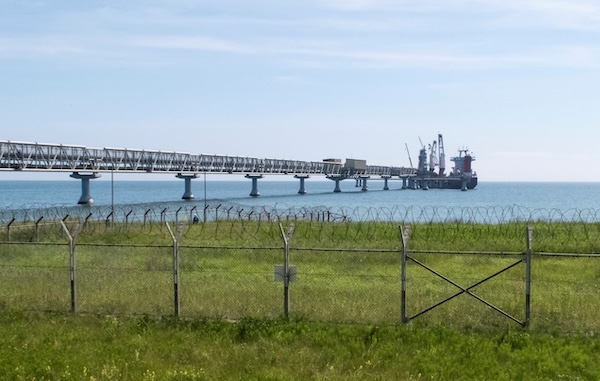 A general view of the liquefied natural gas plant operated by Sakhalin Energy at Prigorodnoye on the Pacific island of Sakhalin, Russia 15 July 2021. Picture taken 15 July 2021;
Credit: Reuters/Vladimir Soldatkin/File Photo
A general view of the liquefied natural gas plant operated by Sakhalin Energy at Prigorodnoye on the Pacific island of Sakhalin, Russia 15 July 2021. Picture taken 15 July 2021;
Credit: Reuters/Vladimir Soldatkin/File Photo
LONDON (Reuters) - US and Russian government officials discussed several energy deals on the sidelines of negotiations this month that sought to achieve peace in Ukraine, according to five sources familiar with the talks.
These deals were put forward as incentives to encourage the Kremlin to agree to peace in Ukraine and for Washington to ease sanctions on Russia, they said.
Russia has been cut off from most international investment in its energy sector and from striking major deals due to sanctions following the Ukraine invasion that began in February 2022.
The officials discussed the possibility of Exxon Mobil re-entering Russia’s Sakhalin-1 oil and gas project, three of the sources said.
They also raised the prospect of Russia purchasing US equipment for its LNG projects, such as Arctic LNG 2, which is under western sanctions, four sources said.
None of the sources could be named because they were not authorised to speak publicly on the negotiations.
Another idea was for the US to purchase nuclear-powered icebreaker vessels from Russia, Reuters reported on Friday 15 August 2025.
The talks were held during US envoy Steve Witkoff’s trip to Moscow earlier this month when he met with Russian President Vladimir Putin and his investment envoy Kirill Dmitriev, three of the sources said. They were also discussed within the White House with US President Donald Trump, two of the sources said.
These deals were also briefly discussed at the Alaska summit on Friday 15 August, one source said.
“The White House really wanted to put out a headline after the Alaska summit, announcing a big investment deal,” said one of the sources. “This is how Trump feels like he’s achieved something.”
Trump and his national security team continue to engage with Russian and Ukrainian officials towards a bilateral meeting to stop the killing and end the war, a White House official said in response to questions about the deals. It is not in the national interest to further negotiate these issues publicly, the official said.
A spokesperson for Dmitriev declined to comment.
Exxon Mobil declined to comment. Rosneft and Novatek did not respond to requests for comment.
Talks coincide with threats
Trump has threatened to impose more sanctions on Russia unless peace talks make progress and to place harsh tariffs on India, a major buyer of Russian oil. Those measures would make it difficult for Russia to maintain the same level of oil exports.
Trump’s deal-making style of politics has been on display before in the Ukraine talks, when earlier this year the same officials explored ways for the US to revive Russian gas flows to Europe. These plans have been stalled by Brussels, which put forward proposals to fully phase out Russian gas imports by 2027.
The latest discussions have shifted to bilateral deals between the US and Russia, pivoting away from the European Union, which, as a bloc, has been steadfast in its support for Ukraine.
On the same day as the Alaska summit, Putin signed a decree that could allow foreign investors, including Exxon Mobil, to regain shares in the Sakhalin-1 project. It is conditional on the foreign shareholders taking action to support the lifting of Western sanctions on Russia.
Exxon exited its Russian business in 2022 after the Ukraine invasion, taking a $4.6 billion impairment charge. Its 30% operator share in the Sakhalin-1 project in Russia's far east was seized by the Kremlin that year.
The US has placed several waves of sanctions on Russia’s Arctic LNG 2 project, starting in 2022 and cutting off access to ice-class ships that are needed to operate in that region for most of the year.
The project is majority-owned by Novatek, which started working with lobbyists in Washington last year to try to rebuild relations and lift the sanctions.
The Arctic LNG 2 plant resumed natural gas processing in April, albeit at a low rate, Reuters reported. Five cargoes have been loaded from the project this year onto tankers under sanctions. A production train was previously shut down due to the difficulties in exporting given the sanctions.
This project was intended to have three LNG processing trains. The third is in planning stages, with technology expected to be supplied by China.
Washington is seeking to prompt Russia to buy US technology rather than Chinese as part of a broader strategy to alienate China and weaken relations between Beijing and Moscow, one of the sources said.
China and Russia declared a "no limits" strategic partnership days before Putin sent troops into Ukraine. Xi has met Putin over 40 times in the last decade and Putin in recent months described China as an ally.








